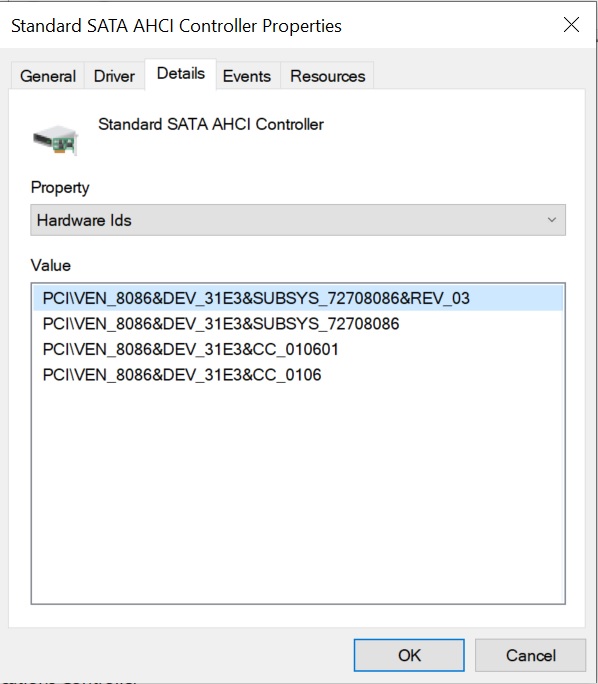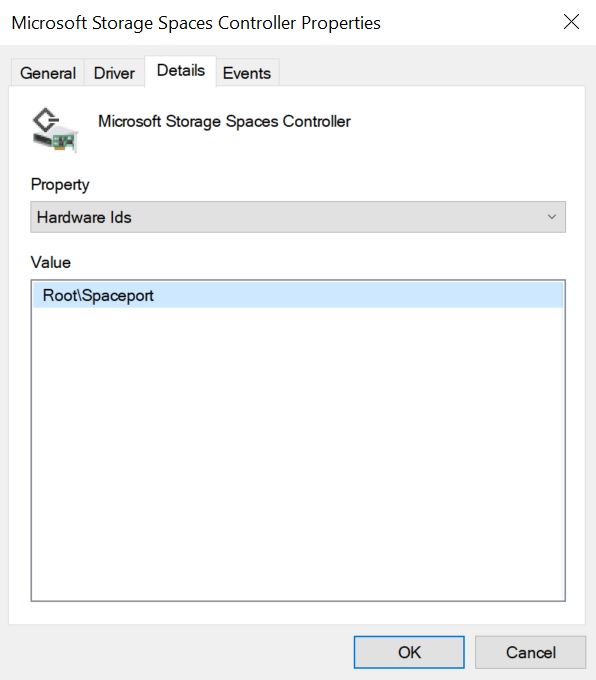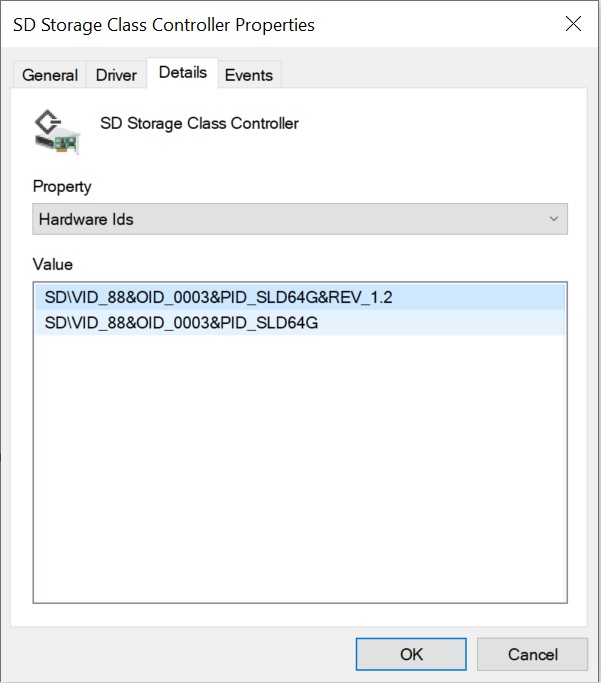It may be possible to get an Intel RSTe driver installed (even the original one by using the “Have Disk” option), but I do not really recommend it. If the SSDs have a proper Garbage Collection, TRIM is not as important for RAID1 arrays than for RAID0 ones.
Could I request for a modded Intel AHCI/RAID driver for my system:
1. CPU: Gemini Lake N4100, 4GB Ram, Brand: Chuwi Lapbook Pro
2. KingSpec M2 SSD Sata 3 128GB, model no:NT-128. This M2 SSD was formatted and initialized by using an external enclosure. Under file explorer and disk management, it can be detected with external enclosure.
3. Running Win 10 Home (v1809). Windows is residing in a 64GB eMMC as C drive.
4. Under Device Manager, IDE ATA/ATAPI Controller shows Standard SATA AHCI Controller (p1.jpg) with hardware ids:
PCI\VEN_8086&DEV_31E3&SUBSYS_72708086&REV_03
PCI\VEN_8086&DEV_31E3&SUBSYS_72708086
PCI\VEN_8086&DEV_31E3&CC_010601
PCI\VEN_8086&DEV_31E3&CC_0106
The Storage Controllers have two controllers:
(1) Microsoft Storage Space Controller (p2.jpg) -
Root\Spaceport
(2) SD Storage Class Controller (p3.jpg) -
SD\VID_88&OID_0003&PID_SLD64G&REV_1.2
SD\VID_88&OID_0003&PID_SLD64G
FYI, I have followed the steps carefully using the driver,mod+signed 64bit Intel RST driver v16.7.1.101 because of post #1014 ϻ. Win-RAID_ca certificate was applied first before installing the respective driver. I have selected each of the listed model (Intel 100 series, 300 Series, 6th Gen Core Processor) All did not work.
Thank you.



@N.D
To be honest, I haven’t yet seen such HardwareIDs of an Intel SATA AHCI Controller.
Maybe I will add the missing HardwareIDs to the INF files of my mod+signed Intel RST drivers in the future, but why do you want to replace the generic MS AHCI driver by an Intel one, which natively doesn’t support your specific system?
Hi @Fernando ,
Apparently, the formatted M2 SSD could not be detected in Windows (under Disk Management) and also in the BIOS. The BIOS can detect the M2 SSD drive if it is in a USB enclosure case.
Based on my research, I arrived at your wonderful site. Many users who used chinese notebook brands like Chuwi or Jumper have issues for the detection of their M2 SSD drives regardless of brands. Somehow Windows is “particular” and will only “initialize” with a mod-signed Intel RST drivers. That is why your website have many such users who came here to ask for help. I really don’t understand this logic. Would it be possible to create one for me to try? Thank you very much.
As I told you @N.D First, before any of this (Drivers) matter, the drive must show in the device manager (even if as a yellow bang/not working), it has to be there first and it’s not so you have some incompatibility issue which we’re covering in your thread.
This is in regards to working in your notebook normally, how you plan to use it, not in an external enclosure like you are using above
@N.D
Lost_N_BIOS is right: The fact, that your new SSD is neither detected by the BIOS nor by the Windows Disk Management, indicates, that your problem is not driver, but BIOS related.
Your M.2 connected SATA SSD has an own AHCI Controller and is not connected to any on-board Intel SATA port. Consequence: No Intel AHCI driver (not even a modded one), will support the AHCI Controller, which is located within your M.2 connected SSD.
This is what I suggest to do:
- Find out, whether the on-board M.2 port supports the SATA AHCI or the NVMe protocol. If it should be the latter, you may not be able to use the KingSpec SATA III NT-128 SSD.
- If the M.2 port supports the SATA AHCI protocol, you will have to add a specific AHCI EFI module to the DXE Volume of the Lapbook’s BIOS. The only BIOS module I know for this purpose is the one named SAMSUNG_M2_DXE.ffs. You can find the download link and the related guide about how to insert it, within the start post of >this< thread.
EDIT:
This "Standard SATA AHCI Controller" is currently using the generic MS in-box AHCI driver. This driver could be replaced by a freshly modded Intel AHCI driver, but this wouldn’t help you, because it is not your KingSpec M.2 SSD, which is managed by these AHCI drivers.
I am tuning up a older PC I used to have that I gave to my nephew.Its a MSI Z97 MPower Max AC with a i7 4790 oc’d to 5.0…Right now it has 14.8.18.1066 for it’s Sata AHCI Controller.Is there any other better one for this old Devi’ls Canyon mb .
Hello guys.
I have recently aquired a Lenovo Thinkpad W701DS laptop, which unfortunately has the Intel OROM version 9.5.0.1037 in the latest available BIOS. I’ve used Andy’s Pheonix tool to extract the OROM from the BIOS ROM file, but I’m having trouble rebuilding the BIOS ROM file using the modified OROM file using cbrom.exe. Could anybody please help me? I’ve attached the BIOS file and the Intel OROM file which I extracted from it.
@knubbze :
Welcome to the Win-RAID Forum!
Why did you post your request into this specific thread with the topic “Modded Intel AHCI and RAID Divers”, which has nothing to do with your problem?
Please have a look into the start post of >this< thread and try to update the Intel RST RAID Option ROM yourself.
If you should need additional support. please post your request into the “BIOS Modding” Sub-Forum and don’t forget to attach the BIOS file you want to get modified.
Regards
Dieter (alias Fernando)
Thanks for the prompt reponse, Fernando, and many apologies for posting in the wrong thread/forum. I’ll re-post it in the correct forum as you suggest. I looked in the thread that you kindly linked, but that seems to be for AMI BIOSes, rather than Pheonix?
Yes. If the BIOS is an old non-UEFi Phoenix one, you should look into the first post of >this< thread.
Yes. If the BIOS is an old non-UEFi Phoenix one, you should look into the first post of >this< thread.
Apologies if I’m hijacking the thread, but just to make sure I am choosing the correct OROM for my laptop’s chipset; it uses the Intel QM57 - which OROM is suitable for this chipset? Thanks again.
@knubbze :
According to the feedback I got from various users the original and TRIM-in-RAID0 modded Intel RST RAID ROM modules v10.1.0.1008 and v11.2.0.1006 should work fine with Intel 5-Series chipset RAID systems (look >here<).
Hi @Fernando ! How are you?
I am trying to add the driver AHCI Controller DEV_9D03 on my Samsung Expert X51 notebook - Model: Samsung NP500R5L-YD2BR -
https://www.samsung.com/br/support/model/NP500R5L-YD2BR/
but every time Windows 7 x64 informs that the device was not found, I will add photos and the files that I have downloaded to the installation and I will also add my backup of Windows 10, if you can help me I will be very grateful since already.
Sata AHCI Controller DEV_9D03 - by Fernando
Drivers by Fernando - Windows 7 x64
https://www.4shared.com/s/fNmeN5Wrxee
Windows 10 x64
https://imgur.com/ztAiUXR
Drivers Win10 x64 - Drivers
https://www.4shared.com/s/fNlRDZA_1fi
Hi Frenado will you mod the latest 17.5.1.1021
https://downloadcenter.intel.com/en-us/d…-?product=55005
Why should I do that?
The latest Intel RST drivers are worse for old Intel chipset systems than those, which natively support them.
I see.Well the worst case I have been face recently…
the RST V17 cause Two windows 10 Insider build 18936 and 18941 cannot be install properly due to the bugs of the driver…
I have to revert as RST 14.X family to solve it…
Fernando,
I’m sorry if this is the wrong place to ask but I really do need some help and as far as I can tell, you are “the man” that has the knowledge!
I have an ASUS motherboard, P8H61-M LE/USB3. I have recently installed a Samsung SSD and would like advice on AHCI drivers.
The native driver, on the ASUS website, is v10.1.0.1008.
I have spent hours trying to understand how to identify the string that tells me what driver to search for.
I HAVE found your driver, v12.9.4.1000 but I’m unsure if it is correct.
I thank you so much for any help.
Mike
@MLHiFi :
Hello Mike,
welcome to the Win-RAID Forum!
For Intel 6-Series chipset systems running in AHCI mode I recommend to install the "pure" mod+signed Intel RST(e) driver v13.2.8.1002. If your OS is Win10, you can alternatively use the in-box MS AHCI driver.
Regards
Dieter (alias Fernando)